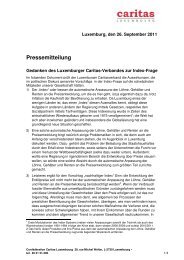Sozialalmanach - Caritas Luxembourg
Sozialalmanach - Caritas Luxembourg
Sozialalmanach - Caritas Luxembourg
Create successful ePaper yourself
Turn your PDF publications into a flip-book with our unique Google optimized e-Paper software.
lessings: A complete collapse of the world economy has been prevented. It appears that<br />
we are through the deepest waters of the economic contraction, and a nascent recovery is<br />
under way. However, caution is warranted: a self-sustaining recovery in the real economy<br />
will only begin when private economic actors are again ready and willing to take over.<br />
2. The Politics of Economics<br />
The full political implications of the economic crisis are difficult to discern at present.<br />
Yet there has been one obvious shift: public authorities – especially governments and central<br />
banks – have taken an unprecedented hyperactive role in response to the credit freeze panic.<br />
Suddenly, in mid-2007, the state (re-)emerged as a key strategic economic actor. Faced with<br />
an exceptionally deep crisis, most advanced economy governments showed little inhibition<br />
in pursuing bold strategies of crisis management, on a scale truly unthinkable only a few<br />
years ago. This happened despite the standing hegemony of neo-liberal doctrine, which<br />
proclaimed unequivocally that government was the problem and markets the solution. It<br />
is perhaps no exaggeration to claim that the state – or rather the taxpayer – has thus far<br />
saved modern capitalism from meltdown.<br />
This powerful and unexpected resurgence of state intervention has reinforced the truism<br />
that without the state, modern market economies are not able to thrive. This is what the<br />
economic anthropologist Karl Polányi has called the ‘embeddedness’ of economics. Effective<br />
market allocation depends, first and foremost, on the political protection of property<br />
rights and contract laws. In his Great Transformation, Polányi 3 shows that public intervention<br />
and regulation have historically played a decisive role in the institutional separation<br />
of society into an economic and political sphere by providing a supportive framework<br />
in which markets can prosper. Embedding markets is essentially a political activity of<br />
institution-building. Institutions are enduring rules for making important (economic)<br />
decisions. Property rights are assigned, restricted, qualified, and regulated by political<br />
decisions. Modern capitalism not only requires regulatory systems at the micro level, but also<br />
effective macro institutions, both monetary and fiscal. Although redistributive institutions<br />
such as unemployment benefits, public pensions, education, and healthcare are provided for<br />
through non-market arrangements, they are nevertheless intimately connected to the private<br />
market economy, through which they are financed and for which they perform stabilising<br />
and productive functions. Thus, social protection, despite not being market-generated,<br />
does serve to embed mature capitalist economies. All the above institutional features of<br />
advanced market economies have a significant impact on production, resource allocation,<br />
3 Polányi (1944; 1985).<br />
149








